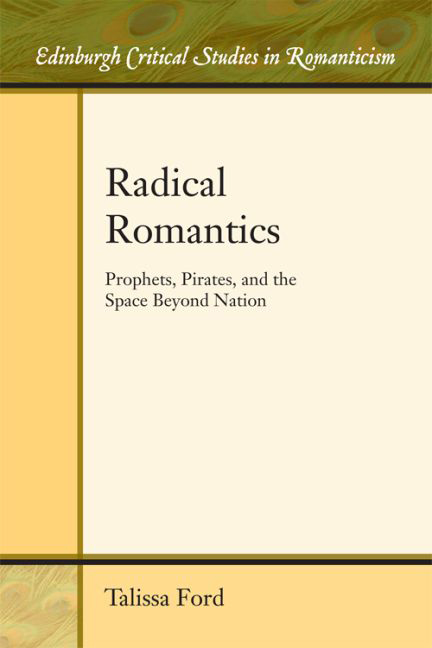Book contents
- Frontmatter
- Contents
- List of Illustrations
- Acknowledgements
- Introduction: Romanticism Off the Map
- 1 It is Not Amiss to Speak of His Beard
- 2 A Pirate or Anything
- 3 Coming Up From the Midst of the Sea
- 4 Jerusalem is Scattered Abroad
- 5 From Here to Timbuktu
- Conclusion: Land Pirates and Republican Ragamuffins
- Index
3 - Coming Up From the Midst of the Sea
Published online by Cambridge University Press: 23 September 2017
- Frontmatter
- Contents
- List of Illustrations
- Acknowledgements
- Introduction: Romanticism Off the Map
- 1 It is Not Amiss to Speak of His Beard
- 2 A Pirate or Anything
- 3 Coming Up From the Midst of the Sea
- 4 Jerusalem is Scattered Abroad
- 5 From Here to Timbuktu
- Conclusion: Land Pirates and Republican Ragamuffins
- Index
Summary
Symbolic reading is probably the worst way to read a literary text. Each time we are bothered by language that is too strong, we say: it is a symbol. […] Yet, if prophetic words reach us, what they make us feel is that they possess neither allegory nor symbol. […] It is a speech that takes up all of space and that is still essentially not fixed.
Maurice Blanchot, The Book to ComeProphecy just might be the piracy for a new age, a practice that ‘takes up all of space and that is still essentially not fixed’, in Blanchot's words. Like the space of the sea, the space of God defies borders, but like the sea it is vulnerable to the imposition of territory: the land of God is always about to collapse into empire. Colonists spread Britain, and prophets spread Christianity; if the prophet's word takes up all of space, it might also take over all of space. What is the difference between building colonial outposts in Africa and re-building the city in Palestine? Where is the overlap between the Empire and the empire? These are the questions with which Romantic-era prophets had to grapple; their prophetic project was redefining the kind of space that prophecy might take over. The space in question: Jerusalem.
In the late eighteenth and early nineteenth centuries, Jerusalem was part of the Ottoman Empire and therefore complicated by the imperial struggles we've seen in previous chapters – complicated, in short, by its Easternness. Joanna Southcott's and Richard Brothers’ prophecies raise geographical questions both concrete and abstract: is the East necessarily in the east? East of what, exactly? Said argues that the East ‘alternated in the mind's geography between being an Old World to which one returned, as to Eden or Paradise, there to set up a new version of the old, and being a wholly new place to which one came as Columbus came to America, in order to set up a New World …’ Said's pairing of Eden with the colonisation of America is telling; the newness of Eden was itself the fantasy imposed on colonial projects, America and Jerusalem alike.
- Type
- Chapter
- Information
- Radical RomanticsProphets, Pirates, and the Space Beyond Nation, pp. 67 - 90Publisher: Edinburgh University PressPrint publication year: 2016



